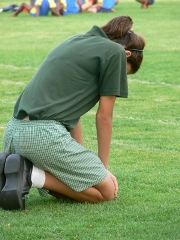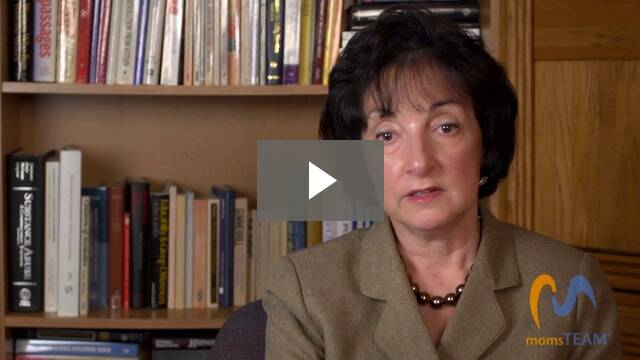As a neuropsychologist specializing in the evaluation and management of sports concussions, it is distressing to see how kids sometimes react when I recommend retirement from contact or collision sports. Even when the recommendation comes after the athlete has suffered a fourth concussion in the past year, is continuing to experience post-concussion symptoms, and has seen their academic performance suffer, a tearful, depressed, and/or angry athlete will sometimes stubbornly respond by saying, "I don't care. I won't stop playing."
Agony or relief?
It is likewise difficult to see good, caring parents struggle to do what is right because they are afraid retirement might leave their child emotionally devastated, and do not want to see their child unhappy. 
Some parents and athletes may try desperately to convince themselves and the doctors that another concussion won't happen, that they will defy the odds. And, believe it or not, in some extreme cases, young athletes in my care have become so angry and emotional (partly due to the brain changes from their concussions which can result in irritability and depression) that they threaten to hurt themselves if their school won't allow them back on the field. It is hard to believe sometimes that sports can have such a strong hold on the lives of our children as well as on our own lives.
For some parents and athletes, a recommendation to retire from contact or collision sports comes as a relief, because the journey of multiple concussions, long-lasting symptoms, and the effect on overall quality of life has led them to appreciate that the brain is too precious to jeopardize any further.
For others, the decision to change sports is extremely agonizing. For them, their sport has defined who they are as athletes, as parents, and as a family. Leaving the sport means no longer being part of a social network and a group of their peers (for both parents and kids), and leaving behind the travel, the games, the tournaments, and joy of team success, and eliminating a way of expressing a specific athletic talent that has been groomed and nurtured for years, often since early childhood. Unfortunately, for a few, it may mean removing the only activity in which the child fields confident and self-assured.
Advice for parents
I have found that the athletes who fare best when forced to retire from a contact or collision sport are those who also enjoy other low-risk sports, are talented in other endeavors in their lives, have clear academic goals, fear the risk of further injuring their brains, have high self-esteem, and have parents who are easily able tomake the responsible choice and support the retirement decision.
As a result, here are some strategies I suggest be employed by parents of children playing contact or collision sports to ensure the best possible outcome for their child:
- Promote "brain hygiene." Teach your child the importance of a healthy brain and make sure that your school also reinforces this message early on. I don't recommend scare tactics, especially with young children. Rather, take a healthy, normalized approach; just as we promote dental hygiene, we should promote what I have called Brain Hygiene.
- Push for consistent enforcement of concussion guidelines/return to play rules. Be sure that the sport in which your child participates not only enforces rules - and, in a majority of states, laws - regarding removal from and return to play, but applies them consistently across the board for all athletes, whether the star quarterback or the last player on the bench.
- Make concussion safety a priority. Be sure that your child's sport makes safety a priority and minimizes the risk of hurtful or aggressive contact in games and in practices, and that your child is fitted with proper, up-to-date equipment. For young athletes, advocate for skill development in a non-contact setting and push for rule changes in high risk sports to make them safer.
- See a concussion specialist. If your child sustains a concussion, be sure to seek care from a licensed health care practitioner trained in sports concussion management. You may best reduce the risk of future concussions and the chances your child will have to give up a sport by managing each concussion very carefully, and not trying to rush the recovery period. Cognitive and physical rest after concussion is critical for recovery. Follow your doctor's instructions carefully. If you believe in your doctor and the team of professionals involved in your child's sports and concussion care, then your child is more likely to as well. If you waiver, it will be more difficult for your child to comply. You set the tone.
- Encourage your child to play a second, non-contact sport. If your child has a passion for a specific contact sport, encourage her to participate and develop a strong interest in a non-contact sport as well. This is important for a number of reasons: it allows your child to become a well-rounded athlete, and if he or she sustains a career-ending injury - to his or her brain or otherwise - in that sport, he or she can transition to the other sport, rather than be left trying to start from scratch with a new sport.
- Build self-esteem outside of sports. Help your child develop strong self-esteem and confidence in general so that they will be more resilient to any loss of a sport activity or even other unexpected losses that might come along in life.
- If necessary, seek psychological help. If your child (and/or you) has difficulty making the transition out of contact/collision sports, seek support from a counselor or psychologist with experience working with families on life adjustment issues and feelings of loss.
Posted September 11, 2011










